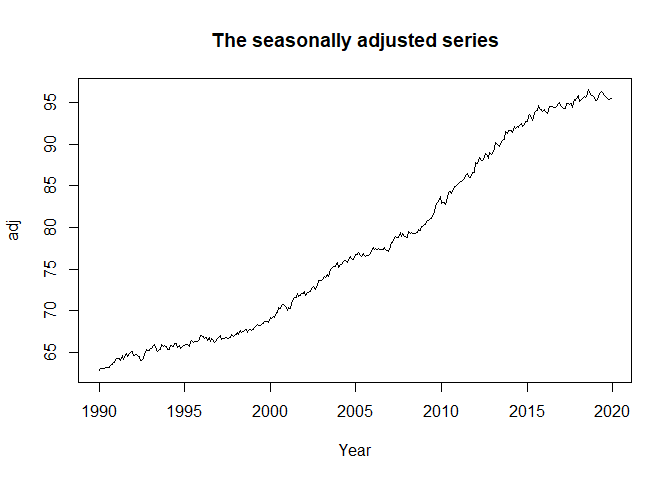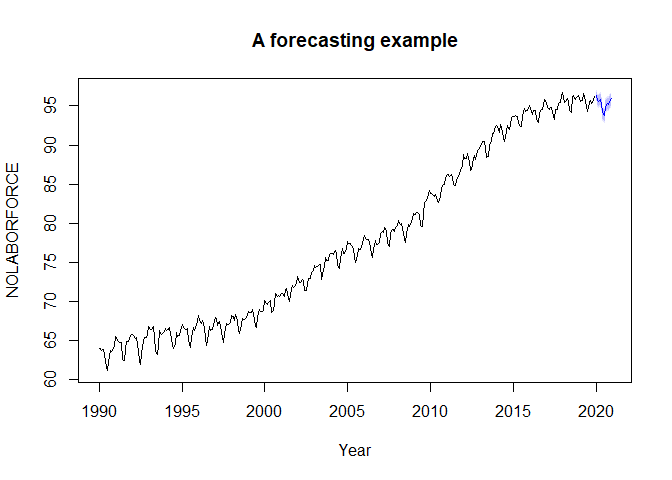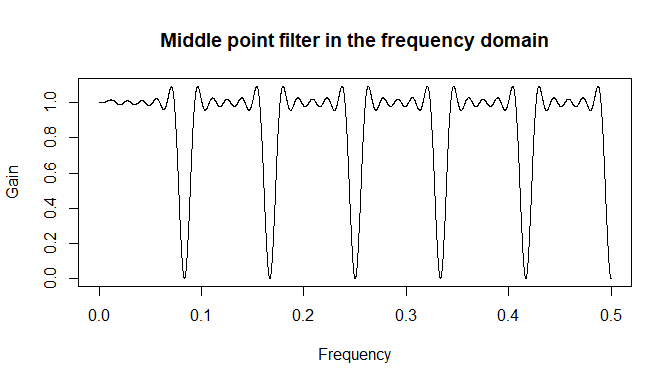Data-Driven Locally Weighted Regression for Trend and Seasonality in TS.
deseats 
The goal of deseats is to provide several methods to decompose seasonal time series. Among them is a new fully data-driven algorithm called DeSeaTS (deseasonalize time series) for locally weighted regression with an automatically selected bandwidth. DeSeaTS accounts for possible short-range dependence in the underlying error process. Furthermore, the base model of the BV4.1 (Berlin Procedure 4.1) can be considered as well. Permission to include the BV4.1 base model procedure was kindly provided by the Federal Statistical Office of Germany.
Installation
You can install the current version of the package from CRAN with:
install.packages("deseats")
Examples
Basic decomposition
This is a basic example which shows you how to decompose a seasonal time series using the DeSeaTS algorithm:
library(deseats)
### Locally weighted regression with automatically selected bandwidth
### (here: local cubic trend)
est <- deseats(NOLABORFORCE, set_options(order_poly = 3))
est@bwidth # The automatically selected bandwidth
#> [1] 0.1968428
### Plot of the results
plot(est, which = 1, xlab = "Year")

Seasonal adjustment
A seasonal adjustment can subsequently be easily achieved using implemented methods.
adj <- deseasonalize(est)
plot(adj, xlab = "Year", main = "The seasonally adjusted series")

Forecasting
If a decomposition via the DeSeaTS algorithm is suitable, the residual series can be further analyzed using autoregressive moving-average (ARMA) models.
model <- s_semiarma(NOLABORFORCE, set_options(order_poly = 3))
model
#>
#> *******************************************
#> * *
#> * Fitted Seasonal Semi-ARMA *
#> * *
#> *******************************************
#>
#> Series: NOLABORFORCE
#>
#> Nonparametric part (Trend + Seasonality):
#> -----------------------------------------
#>
#> Kernel: Epanechnikov
#> Boundary: Extend
#> Bandwidth: 0.1968
#>
#> Trend:
#> ------
#> Order of local polynomial: 3
#>
#> Seasonality:
#> ------------
#> Frequency: 12
#>
#> Parametric part (Rest):
#> -----------------------
#>
#> Call:
#> stats::arima(x = res, order = c(ar, 0, ma), include.mean = arma_mean)
#>
#> Coefficients:
#> ar1
#> 0.6743
#> s.e. 0.0387
#>
#> sigma^2 estimated as 0.07454: log likelihood = -43.77, aic = 91.54
The complete model can then be used for forecasting the seasonal time series. Forecasting intervals can be obtained either through the normality assumption or via a bootstrap.
fc <- predict(model, n.ahead = 12, method = "norm")
plot(fc, xlab = "Year", main = "A forecasting example")

Filters in the frequency domain
The linear locally weighted regression filters can be quickly displayed in the frequency domain.
fr <- seq(0, 0.5, 1e-04) # Frequencies
g_funs <- gain(est, lambda = fr) # Obtain correspondiong gain function values
g_deseas <- g_funs$gain_deseason # Gain function values for deseasonalization
l <- length(g_deseas[, 1])
weights_interior <- g_deseas[(l - 1) / 2 + 1, ] # middle point filter weights
plot(fr, weights_interior, type = "l", xlab = "Frequency", ylab = "Gain",
main = "Middle point filter in the frequency domain")

Interactive decomposition
The provided decomposition methods can also be applied interactively. Run the following code.
runDecomposition()
This starts a shiny app which lets you load data files, decompose the time series saved therein, and download the decomposed data.
Main functions
The main functions of the package are:
deseats(): locally weighted regression with automatically selected bandwidth for decomposition,BV4.1(): BV4.1 base model for decomposition,lm_decomp(): ordinary least squares for decomposition,llin_decomp: local linear regression for decomposition,ma_decomp(): moving averages for decomposition,hamilton_filter(): the time series filter by Hamilton.
The package, however, provides many other useful functions for you to discover.
Datasets
The package contains several seasonal example time series from official sources.
Authors
Yuanhua Feng (Department Economics, Paderborn University, Germany) (Author)
Dominik Schulz (Department Economics, Paderborn University, Germany) (Author, Maintainer)
Contact
For questions, bug reports, etc., please contact the maintainer Mr. Dominik Schulz via [email protected].
